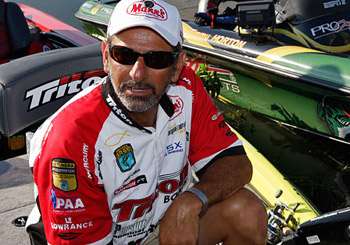
Gas prices are going through the roof. As of today 87 octane is hovering around $4 a gallon and isn't expected to drop much if at all. On the water, it's even higher. What are we to do? We aren't going to stop fishing. That's unthinkable. We need to find a way to conserve.
Paul Elias, Bassmaster Elite Series pro, 1982 Bassmaster Classic champion and holder of the all-time, 4-day tournament weight record of 132 pounds, 8 ounces, knows how to burn gas. He also knows how to conserve it.
Elias, along with Mark Klossner, Mercury Marine Optimax/Pro XS Platform Manager, and Jack Litjens, Mercury Marine Competitive Intelligence Manager and recognized propping expert, offer these six tips for keeping us on the water and within the family budget.
1. "Keep your foot off it!"
Elias says this is the easiest way to increase fuel economy. "Unless there's a good reason to do otherwise, don't run the motor at full throttle. You only waste gas and accomplish nothing. Slow down, save gas and go fishing."
Litjens agrees, "Our research has shown that fuel economy can be essentially doubled if anglers will follow a few simple rules when it comes to running their rigs.
"First, anglers need to prop their boats and motors correctly. Basically, this means the boat should operate at maximum performance at the highest recommended rpm level for the motor minus 50-100 rpm. That will allow the rig to operate more efficiently throughout the entire rpm range.
"For example; in one test we found that fuel economy increased from 3.17 mpg at 5,850 rpm to 4.06 mpg at 5,500 rpm. That's a 28 percent increase in fuel economy with only a 350 drop in operating rpm. And, at 3,000 rpm, the mileage essentially doubled."
Setting up your rig for maximum efficiency isn't easy. There's more to it than your prop, motor and boat. Gross weight, weight distribution, motor height, weather and weather conditions all play a part. You may want to hire a professional to help. Yes, they charge money, but so does the gas station.
2. Upgrade your motor … maybe
"In some cases it might actually make financial sense to upgrade your motor," says Klossner. "With some of our newer models the fuel usage is about half what it was in the older models throughout the rpm range. Upgrading won't make sense for everyone, but if an angler fishes several times a week it will.
"Saving a half tank of gas a week amounts to about $100 at today's prices. Depending upon how much, you fish you might be able to pay for a new motor from fuel savings alone."
3. Maintenance matters
Litjens says it's hard to overemphasize the importance of properly maintaining your motor and rig. "It's important to keep your motor tuned and running properly. And, you want to take care of your prop — repair it immediately if it's damaged — and keep your lower unit in tip-top shape. Maintenance and upkeep pay for themselves."
4. The ethanol issue
You hear all sorts of things about using ethanol blended gasoline in outboard motors. Both Klossner and Litjens agree that it's a nonissue. "We use ethanol blended gasoline for our tests. Mercury motors are designed to run on 10 percent ethanol, higher than that may create problems with corrosion, but at 10 percent everything's fine."
Elias has a real-world perspective: "I've run 10 percent ethanol, and I've run pure gasoline. I can't see any difference in power, performance or mileage. I don't pay any attention to it anymore."
All three emphasize, however, that you should use gas with the manufacturer's recommended octane rating. Moving up or down wastes money.
5. Lighten your load
"A lot of anglers use their boat as an auxiliary garage," says Klossner. "Get the things you don't need out of it. You'd be surprised at how much tackle, rods, reels, coolers and other things accumulated over the years weigh when you add them up.
"And, don't keep your gas tank(s) full unless you're going to use that much fuel on a particular day. Gas weighs about 6.5 pounds per gallon. An extra 20 gallons adds 130 pounds to your rig. The same thing is true with your livewell. Water weighs 8.3 pounds per gallon. Why fill it until — and unless — you need it?"
6. Trailer rather than run
"On the Elite Series tour a lot of us are trailering to ramps close to where we'll be fishing in practice rather than running a long distance over water. Even if your tow vehicle is a gas hog, it still gets at least twice the mileage of your outboard," says Elias. "We don't worry about gas when the tournament is underway, but in practice every penny saved is a help.
"Saving fuel costs is a matter of common sense."




